23 sept 2018
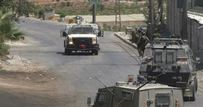
Israeli occupation forces (IOF) on Sunday afternoon stormed Beit Nahalin town, west of the West Bank city of Bethlehem.
Beit Nahalin's mayor Subhi Zeidan said that the IOF raided the town amid heavy firing of live ammunition, sound bombs and teargas canisters, which led to the outbreak of violent clashes.
Zeidan said that the IOF further closed the main entrance to the town, adding that no injuries were reported in the clashes.
He noted that fire flared up in a Palestinian farmland planted with olive trees near Beitar Illit settlement, without giving further details about the incident.
Beit Nahalin's mayor Subhi Zeidan said that the IOF raided the town amid heavy firing of live ammunition, sound bombs and teargas canisters, which led to the outbreak of violent clashes.
Zeidan said that the IOF further closed the main entrance to the town, adding that no injuries were reported in the clashes.
He noted that fire flared up in a Palestinian farmland planted with olive trees near Beitar Illit settlement, without giving further details about the incident.
22 sept 2018
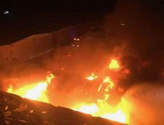
Dozens of Israeli soldiers invaded, on Saturday at dawn, Sebastia town, northwest of the northern West Bank city of Nablus, and started removing Palestinian flags, leading to protests, before the soldiers fired many live round and gas bombs, resulting in a fire that consumed a farm.
Mohammad Azem, the head of Local Council in Sebastia, said the farm was burnt shortly after the army invaded the town, due to the large number of gas bombs fired by the soldiers at random, to suppress local protesters.
Azem added that many Palestinians suffered the effects of teargas inhalation, and received the needed treatment at the scene.
The incidents took place after the soldiers started removing Palestinian flags, raised in several parts of Sebastia.
It is wort mentioning that Sebastia is subject to ongoing invasions by the soldiers, and by illegal colonialist settlers, especially in the archeological area.
Mohammad Azem, the head of Local Council in Sebastia, said the farm was burnt shortly after the army invaded the town, due to the large number of gas bombs fired by the soldiers at random, to suppress local protesters.
Azem added that many Palestinians suffered the effects of teargas inhalation, and received the needed treatment at the scene.
The incidents took place after the soldiers started removing Palestinian flags, raised in several parts of Sebastia.
It is wort mentioning that Sebastia is subject to ongoing invasions by the soldiers, and by illegal colonialist settlers, especially in the archeological area.
21 sept 2018
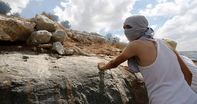
Dozens of Palestinians were injured on Friday afternoon when the Israeli occupation forces (IOF) violently quelled peaceful demonstrations in different West Bank areas.
At least 12 Palestinians, including a journalist, were injured by rubber-coated metal bullets, while dozens others suffered teargas inhalation when the IOF attacked a demonstration in Ras Karkar village, west of Ramallah.
Local sources said that Palestinians have organized peaceful demonstrations over the past three weeks in Ras Karkar in protest at Israel's confiscation of Palestinian-owned lands in the village in favor of settlement projects.
Two Palestinian youths were injured by rubber-coated metal bullets and others choked on teargas when the IOF quelled the weekly demonstration of Kafr Qaddum, east of Qalqilya, which calls for opening the village's main road that was closed 15 years ago.
Popular resistance coordinator Murad Shtewi said that the IOF attacked the protesters with live ammunition, rubber-coated metal bullets, sound bombs, and teargas canisters, while Palestinian youths responded by throwing stones and empty bottles.
Meanwhile in Ramallah, a number of Palestinian citizens suffered breathing difficulties as a result of inhaling teargas during the IOF quelling of Bil'in's weekly demonstration against settlement.
Local sources said that the IOF heavily fired teargas canisters at the demonstrators, burning some dunums of Palestinian lands planted with olive trees.
At least 12 Palestinians, including a journalist, were injured by rubber-coated metal bullets, while dozens others suffered teargas inhalation when the IOF attacked a demonstration in Ras Karkar village, west of Ramallah.
Local sources said that Palestinians have organized peaceful demonstrations over the past three weeks in Ras Karkar in protest at Israel's confiscation of Palestinian-owned lands in the village in favor of settlement projects.
Two Palestinian youths were injured by rubber-coated metal bullets and others choked on teargas when the IOF quelled the weekly demonstration of Kafr Qaddum, east of Qalqilya, which calls for opening the village's main road that was closed 15 years ago.
Popular resistance coordinator Murad Shtewi said that the IOF attacked the protesters with live ammunition, rubber-coated metal bullets, sound bombs, and teargas canisters, while Palestinian youths responded by throwing stones and empty bottles.
Meanwhile in Ramallah, a number of Palestinian citizens suffered breathing difficulties as a result of inhaling teargas during the IOF quelling of Bil'in's weekly demonstration against settlement.
Local sources said that the IOF heavily fired teargas canisters at the demonstrators, burning some dunums of Palestinian lands planted with olive trees.
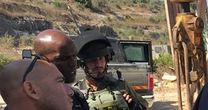
The Israeli occupation forces (IOF) on Thursday in the western area of Salfit city tried to prevent the local municipal council from drilling an artesian well.
Municipal official Ra’ed al-Zair said that the drilling activity would continue despite Israeli attempts to prevent the municipality from digging a well for the local residents.
Zair affirmed that the Salfit municipality is responsible for serving the city and its residents.
The Israeli occupation authority in the West Bank persist in stealing groundwater seizing natural resources in Palestinian areas and using them to the benefit of Jewish settlers.
Municipal official Ra’ed al-Zair said that the drilling activity would continue despite Israeli attempts to prevent the municipality from digging a well for the local residents.
Zair affirmed that the Salfit municipality is responsible for serving the city and its residents.
The Israeli occupation authority in the West Bank persist in stealing groundwater seizing natural resources in Palestinian areas and using them to the benefit of Jewish settlers.
20 sept 2018
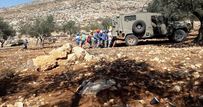
In the town of Kifl Hares, north of Salfit, the owners of the land are forbidden from entering their land during the olive season. In the current season, which begins several days later, farmer Ahmed Buzia wanted to enter his land near the settlement of Ariel with a group of volunteers, yet their efforts were in vain.
Killing the joy of olive season
Farmer Bouzia says: “Despite the joy of the arrival of the olive season, the occupation didn’t allow us to feel its beauty, we are not even allowed to enter our land which we used to enter whenever we liked.”
“We wait hours in front of the settlement of Ariel to no avail, and sometimes according to the mood of the soldier or the officer, we are allowed to enter but without a tractor, they search us and insult us,” he told the PIC reporter.
Prevention and arrest
Two days ago, the Israeli occupation authorities prevented farmers from Kifl Hares from entering their agricultural land near the settlement of Ariel, north of Salfit. Farmer, Abdel Karim Mahmud Yousef was arrested from the town while trying to enter his land adjacent to the settlement.
According to farmers from Kifl Hares, Israeli soldiers demand permission to allow entry into the olive fields adjacent to the settlement. The West Bank farmers generally suffer every season from not being allowed to cultivate their land near the settlements and behind the wall except for a few times.
Season of harvest
According to the Agriculture Director in Salfit, Ibrahim Al-Hamad, the Israeli occupation’s restrictions harm the farmers of Salfit villages and towns every season, including the town of Kifl Hares, stressing that the date of harvesting olives this year is on Friday, 12 October 2018, and that it is not right to pick it up early, but it is alright to delay it.
Assaults
Ghassan Daghlas, the head of the West Bank settlements profile, warned of the escalation of settler attacks as the preparations for the olive harvest begins including attacking Palestinian property and farmland, as date for olive harvest on 12 October approaches, calling on farmers to beware of attacks.
Researcher Khaled Maali pointed out that the Israeli army and settlers deliberately disturb farmers’ joy during the season in many ways such as: preventing them from accessing their land, cutting trees and branches, pouring incendiary materials on trees, beating farmers, shooting at them, stealing the fruits of olive trees, prohibition of picking fruits from fields near settlements or behind the wall, bulldozing trees for the benefit of settlement expansion, uprooting olive trees and re-planting them in the settlements, and many more.
Killing the joy of olive season
Farmer Bouzia says: “Despite the joy of the arrival of the olive season, the occupation didn’t allow us to feel its beauty, we are not even allowed to enter our land which we used to enter whenever we liked.”
“We wait hours in front of the settlement of Ariel to no avail, and sometimes according to the mood of the soldier or the officer, we are allowed to enter but without a tractor, they search us and insult us,” he told the PIC reporter.
Prevention and arrest
Two days ago, the Israeli occupation authorities prevented farmers from Kifl Hares from entering their agricultural land near the settlement of Ariel, north of Salfit. Farmer, Abdel Karim Mahmud Yousef was arrested from the town while trying to enter his land adjacent to the settlement.
According to farmers from Kifl Hares, Israeli soldiers demand permission to allow entry into the olive fields adjacent to the settlement. The West Bank farmers generally suffer every season from not being allowed to cultivate their land near the settlements and behind the wall except for a few times.
Season of harvest
According to the Agriculture Director in Salfit, Ibrahim Al-Hamad, the Israeli occupation’s restrictions harm the farmers of Salfit villages and towns every season, including the town of Kifl Hares, stressing that the date of harvesting olives this year is on Friday, 12 October 2018, and that it is not right to pick it up early, but it is alright to delay it.
Assaults
Ghassan Daghlas, the head of the West Bank settlements profile, warned of the escalation of settler attacks as the preparations for the olive harvest begins including attacking Palestinian property and farmland, as date for olive harvest on 12 October approaches, calling on farmers to beware of attacks.
Researcher Khaled Maali pointed out that the Israeli army and settlers deliberately disturb farmers’ joy during the season in many ways such as: preventing them from accessing their land, cutting trees and branches, pouring incendiary materials on trees, beating farmers, shooting at them, stealing the fruits of olive trees, prohibition of picking fruits from fields near settlements or behind the wall, bulldozing trees for the benefit of settlement expansion, uprooting olive trees and re-planting them in the settlements, and many more.
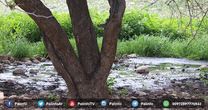
Ecologists and farmers have sounded alarm bells over the acute damage wrought by Israel’s sewage disposal pouring into Palestinian olive groves in Salfit.
Reporting from the scene, eye-witnesses said Palestinian cultivated lands have been terribly tainted by sewage waste spilling from the Israeli Baduel settlement, built on Palestinian lands in Salfit.
Researcher Khaled Maali warned of the tragic fallouts of sewage waste, mingled with industrial chemicals, which has been pouring into Palestinian springs and streams from 25 Israeli settlements and industrial zones.
Salfit, home to natural masterpieces and prolific agricultural output, has been turned into a source of epidemics, infectious diseases, insects, rodents, pigs, and stench due to Israel’s untreated sewage disposal and frenzied settlement activity.
Reporting from the scene, eye-witnesses said Palestinian cultivated lands have been terribly tainted by sewage waste spilling from the Israeli Baduel settlement, built on Palestinian lands in Salfit.
Researcher Khaled Maali warned of the tragic fallouts of sewage waste, mingled with industrial chemicals, which has been pouring into Palestinian springs and streams from 25 Israeli settlements and industrial zones.
Salfit, home to natural masterpieces and prolific agricultural output, has been turned into a source of epidemics, infectious diseases, insects, rodents, pigs, and stench due to Israel’s untreated sewage disposal and frenzied settlement activity.
18 sept 2018
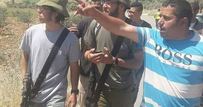
Groups of Israeli settlers on Tuesday attacked Palestinian workers in Jama'in town, south of the West Bank city of Nablus.
Anti-settlement activist Ghassan Daghlas said that over 50 settlers harassed Palestinians working in different quarries in Jama'in.
Daghlas added that the settlers assaulted some workers and rioted in the area before they withdrew.
Settler attacks have been stepped up recently on Palestinian citizens and their property in the West Bank under the protection of the Israeli army.
Anti-settlement activist Ghassan Daghlas said that over 50 settlers harassed Palestinians working in different quarries in Jama'in.
Daghlas added that the settlers assaulted some workers and rioted in the area before they withdrew.
Settler attacks have been stepped up recently on Palestinian citizens and their property in the West Bank under the protection of the Israeli army.

The UN Humanitarian Coordinator, Jamie McGoldrick, Monday announced the release of $ 1 million from the Humanitarian Fund for the occupied Palestinian territory to prevent the collapse of life-saving services in the besieged Gaza Strip.
According to a press release by the United Nations Office for the Coordination of Humanitarian Affairs (OCHA) in the occupied Palestinian territory, the allocation will go to the UN-Assisted Emergency Fuel Program, which provides emergency fuel, mainly for back-up electricity generators, at around 250 critical health, water and sanitation facilities in the Gaza Strip.
"This allocation is critical to prevent a complete collapse of services and a potential outbreak of disease," said McGoldrick. "Unfortunately, it comes in the absence of action from the relevant authorities, who have responsibility for the well-being of Gaza's citizens, or predictable donor support," he added.
With daily power outages of up to 20 hours per day, approximately 950,000 liters of emergency fuel are needed per month to enable life-saving services in the Gaza Strip.
Funds donated for emergency fuel in 2018 have been exhausted, and the UN delivered its final stocks on September 5th.
With this allocation, at least US$ 2 million in additional support is still needed to cover the bare minimum of health, water and sanitation services relying on emergency fuel through the end of 2018.
The emergency fuel funding gap comes against the backdrop of an overall humanitarian funding crisis, with record-low support levels in 2018, said the release.
Gaza's water and sanitation facilities have a near zero stock of emergency fuel, while public hospitals currently have only enough fuel to maintain essential services for a few more weeks, on average, with some facilities facing even greater risks.
Another 42 private and public health facilities have even fewer fuel stocks. Critical facilities have implemented strict mitigation measures to extend, as much as possible, fuel resources provided to date.
The Municipality of Gaza reports said that due to lack of fuel, garbage collection is taking place only once every 5-7 days, leaving 40,000-50,000 tons of trash accumulating on the street, posing associated health risks.
"A $1 million allocation will support the delivery of life-saving services for around 1.5 months at critical health, water and sanitation services," said McGoldrick. "But additional action is urgently needed to ensure sustainable delivery of emergency fuel. Palestinian families in Gaza should not be deprived of their right to access essential services," he continued.
According to a press release by the United Nations Office for the Coordination of Humanitarian Affairs (OCHA) in the occupied Palestinian territory, the allocation will go to the UN-Assisted Emergency Fuel Program, which provides emergency fuel, mainly for back-up electricity generators, at around 250 critical health, water and sanitation facilities in the Gaza Strip.
"This allocation is critical to prevent a complete collapse of services and a potential outbreak of disease," said McGoldrick. "Unfortunately, it comes in the absence of action from the relevant authorities, who have responsibility for the well-being of Gaza's citizens, or predictable donor support," he added.
With daily power outages of up to 20 hours per day, approximately 950,000 liters of emergency fuel are needed per month to enable life-saving services in the Gaza Strip.
Funds donated for emergency fuel in 2018 have been exhausted, and the UN delivered its final stocks on September 5th.
With this allocation, at least US$ 2 million in additional support is still needed to cover the bare minimum of health, water and sanitation services relying on emergency fuel through the end of 2018.
The emergency fuel funding gap comes against the backdrop of an overall humanitarian funding crisis, with record-low support levels in 2018, said the release.
Gaza's water and sanitation facilities have a near zero stock of emergency fuel, while public hospitals currently have only enough fuel to maintain essential services for a few more weeks, on average, with some facilities facing even greater risks.
Another 42 private and public health facilities have even fewer fuel stocks. Critical facilities have implemented strict mitigation measures to extend, as much as possible, fuel resources provided to date.
The Municipality of Gaza reports said that due to lack of fuel, garbage collection is taking place only once every 5-7 days, leaving 40,000-50,000 tons of trash accumulating on the street, posing associated health risks.
"A $1 million allocation will support the delivery of life-saving services for around 1.5 months at critical health, water and sanitation services," said McGoldrick. "But additional action is urgently needed to ensure sustainable delivery of emergency fuel. Palestinian families in Gaza should not be deprived of their right to access essential services," he continued.
17 sept 2018
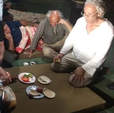
Israeli bulldozers on Monday rolled into Khillet al-Nahla, south of Bethlehem, in a measure deemed to be a sign of a preplanned scheme of collective punishment against Palestinian farmers.
Palestinian locals raised concerns over Israeli attempts to bulldoze their cultivated lands in anticipation of their confiscation in favor of illegal settlement expansion.
Eye-witnesses said the assault comes in response to an anti-occupation stabbing attack carried out by a Palestinian youth near Etzion settlement, which left an Israeli settler dead.
Palestinian locals raised concerns over Israeli attempts to bulldoze their cultivated lands in anticipation of their confiscation in favor of illegal settlement expansion.
Eye-witnesses said the assault comes in response to an anti-occupation stabbing attack carried out by a Palestinian youth near Etzion settlement, which left an Israeli settler dead.
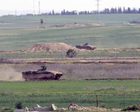
Israeli soldiers fired, on Monday morning, many rounds of live ammunition at several Palestinian farmers, trying to work on their own lands, east of Khan Younis, in the southern part of the Gaza Strip.
Media sources said the soldiers fired many sporadic live rounds at the farmers, forcing them to leave their own lands, in fear of further Israeli escalation and violations.
They added that the shots were fired from several soldiers stationed in fortified military towers across the perimeter fence, in southern Gaza.
In related news, several armored military vehicles, including four D9 bulldozers, invaded Palestinian lands near the perimeter fence in Beit Lahia, in northern Gaza, and started leveling sections close to the fence, while army drones flew overhead.
Media sources said the soldiers fired many sporadic live rounds at the farmers, forcing them to leave their own lands, in fear of further Israeli escalation and violations.
They added that the shots were fired from several soldiers stationed in fortified military towers across the perimeter fence, in southern Gaza.
In related news, several armored military vehicles, including four D9 bulldozers, invaded Palestinian lands near the perimeter fence in Beit Lahia, in northern Gaza, and started leveling sections close to the fence, while army drones flew overhead.
16 sept 2018
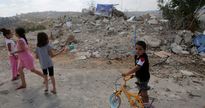
Extremist Israeli settlers on Sunday chased down Palestinian herders while they were grazing their livestock in open fields in Khillet Hamad village in the Jordan Valley.
Local activist Aref Daraghmeh, who monitors Israeli violations in the area, said Israeli settlers cracked down on Palestinian shepherds in Khallet Hamad pastures in the presence of Israeli army patrols.
Israeli settlers routinely show up on occupied Palestinian land and attack shepherds, steal livestock, and damage crops.
Local activist Aref Daraghmeh, who monitors Israeli violations in the area, said Israeli settlers cracked down on Palestinian shepherds in Khallet Hamad pastures in the presence of Israeli army patrols.
Israeli settlers routinely show up on occupied Palestinian land and attack shepherds, steal livestock, and damage crops.
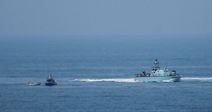
Israeli gunboats on Sunday morning opened fire at Palestinian fishermen sailing off northern Gaza shore.
Local sources said that Israeli gunboats unleashed heavy barrages of machinegun fire on Gaza fishermen, but no injuries were reported.
Israeli navy targets Gaza fishermen almost on a daily basis in a blatant violation of a ceasefire agreement struck between the Israeli occupation and Palestinian resistance groups following the 2014 assault on the Gaza Strip.
Local sources said that Israeli gunboats unleashed heavy barrages of machinegun fire on Gaza fishermen, but no injuries were reported.
Israeli navy targets Gaza fishermen almost on a daily basis in a blatant violation of a ceasefire agreement struck between the Israeli occupation and Palestinian resistance groups following the 2014 assault on the Gaza Strip.
15 sept 2018
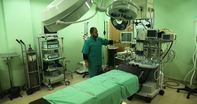
Gaza Ministry of Health on Saturday warned that al-Shifa Hospital may shut down soon due to the depletion of fuel used to operate alternative generators during power outage.
The Ministry last week warned that health services would be suspended in Beit Hanoun and Abu Yousef al-Najjar hospitals, in northern and southern Gaza respectively, for the same reason.
The Ministry in a statement called on donor countries and international organizations to urgently intervene to regularly provide adequate amounts of fuel to Gaza hospitals to keep their services running.
"If the fuel crisis continues, we may reach a stage where services are completely halted at al-Shifa Hospital," spokesman for the Ministry of Health Ashraf al-Qedra told Anadolu Agency.
Based on official statistics, Gaza hospitals need 450,000 liters of fuel per month to operate generators during power outages that last for 8-12 hours a day, and they need 950,000 liters per month during 20-hour power outages.
The Ministry last week warned that health services would be suspended in Beit Hanoun and Abu Yousef al-Najjar hospitals, in northern and southern Gaza respectively, for the same reason.
The Ministry in a statement called on donor countries and international organizations to urgently intervene to regularly provide adequate amounts of fuel to Gaza hospitals to keep their services running.
"If the fuel crisis continues, we may reach a stage where services are completely halted at al-Shifa Hospital," spokesman for the Ministry of Health Ashraf al-Qedra told Anadolu Agency.
Based on official statistics, Gaza hospitals need 450,000 liters of fuel per month to operate generators during power outages that last for 8-12 hours a day, and they need 950,000 liters per month during 20-hour power outages.
Page: 31 - 30 - 29 - 28 - 27 - 26 - 25 - 24 - 23 - 22 - 21 - 20 - 19 - 18 - 17 - 16 - 15 - 14 - 13 - 12 - 11 - 10
